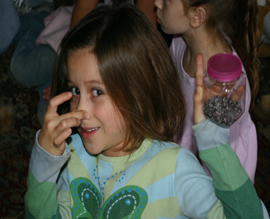
|

Essential Questions:
How did communicable diseases contribute to European success in conquering the New World?
What can I learn from the past?
How am I connected to people and events from the past?
How did the decades of the 18th and 19th centuries change and shape American culture?
What causes change, and what stays the same?
What patterns develop in the course of history?
How are cause and effect shown throughout history?
How is history interpreted to relate the past to the present?
How do the concepts of family, education, leisure, government, economics, religion, and communication define a culture?
History Standards: 8.1 A,B,C,D 8.2.6 A,B,C 8.3.3 A,B,C,D 8.3.6 A,B,C,D8.3.9 A,B,C
Reading Standards: 1.1.5.A,G 1.2.A 1.3.A,F 1.6.A,B,D,E
“I really like it when you come to our classes. The teachers don’t get to give us this hands-on experience, but when you come in it makes learning fun. One thing I really liked learning about was the role the women played. In the units we’ve studied, it was all about the men doing interesting things. But when you came in and told us the roles they played, I was really relieved that the women finally got to do something important. I hope I get the chance to see you again.”
Asha B.


